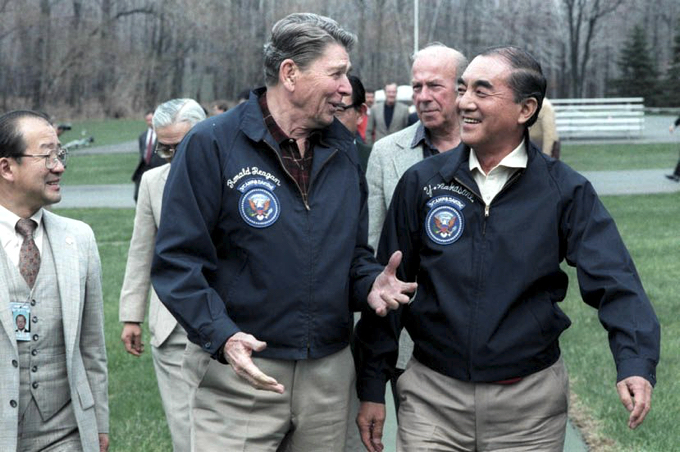
US President Ronald Reagan and Japanese Prime Minister Yasuhiro Nakasone meet at Camp David in 1986.
President Trump said he plans to withdraw from the Intermediate Nuclear Forces (INF) Treaty. US National Security Advisor John Bolton implied the government of Japan already agreed.
Not long after Bolton’s statement, Foreign Minister Taro Kono told reporters the Abe government needed to discuss the fate of the treaty with US officials before commenting. Six days later US Deputy Assistant Secretary of State for Arms Control Tom DiNanno and Deputy Assistant Secretary for East Asia Marc Knapper arrived in Tokyo for a three-day dialog on US extended deterrence guarantees for Japan. The fate of the INF treaty was on their agenda. What did Japanese officials tell the Trump administration?
Japanese advocates for nuclear arms control and disarmament should be concerned about the consequences of INF withdrawal. So should anyone worried about the risk of nuclear and conventional missile strikes against Japan.
If the United States abrogates the INF treaty it may deploy ground-based intermediate range missiles in Japan. Russia and China may take measures to counter those deployments. This would weaken Japanese security, and Japanese citizens could find themselves at the center of a new arms race in East Asia.
Concerned US and Japanese citizens deserve to know if the Japanese foreign ministry is doing anything to save the INF Treaty before Trump makes an official announcement.
Little Cause for Hope
The Abe government has been notably pro-nuclear. Japanese foreign ministry officials applauded the Trump administration’s Nuclear Posture Review (NPR), which called for re-deploying low-yield nuclear weapons in Asia. They successfully lobbied the Obama administration to make US nuclear weapons available in Asia aboard dual-capable aircraft.
Moreover, Takeo Akiba, the current Vice-Minister for Foreign Affairs, told a US congressional commission on the US nuclear posture that “some quarters” in Japan want to revise the three non-nuclear principles to allow for the transit and storage of US nuclear weapons in Japan. In response to a direct question from former US Secretary of Defense James Schlesinger, Akiba replied that he thought building a nuclear weapons storage site in Okinawa “sounds persuasive.”
These statements and the Foreign Ministry’s long record of attempts to obscure discussion on the transit of US nuclear weapons through Japanese territory provide little reason to hope Mr. Akiba or Mr. Kono will oppose Trump’s decision to withdraw from the INF Treaty.
Moreover, they will most likely insist that their dialog with US officials on the subject remain confidential, making it difficult to learn what they told US officials during the extended deterrence dialog. That’s unfortunate. Greater transparency could promote a more informed public debate on the treaty. Prime Minister Abe’s passive role in the fate of the INF Treaty stands in sharp contrast to the active efforts of former Prime Minister Yusuhiro Nakasone to influence the decisions of President Ronald Reagan throughout the negotiations that led to the treaty.
Nakasone’s Concern
The push for the INF treaty emerged in the late 1970s in response to Soviet deployment of the SS-20, a new road-mobile missile with a range of 5,000 kilometers that could carry three nuclear warheads. US and NATO negotiators were exclusively focused on the threat to Western Europe. Nakasone personally intervened to remind Reagan that the new Soviet SS-20 deployments were also a threat to Japan. If the United States abrogates the INF Treaty it will free Russia to deploy new nuclear-capable nuclear missiles that can strike US military bases in Japan.
US analysts and officials pushing to scrap the treaty want to deploy new conventionally armed ground-based missiles in Asia with ranges that are currently prohibited by the INF. They claim it is necessary to increase US conventional superiority over China even though Chinese military professionals already recognize US nuclear and conventional superiority. Regardless of the merits of that argument, Russia may feel the need to deploy new nuclear-armed missiles to counter the new US deployments in Japan.
The combination of the Abe government’s support for redeploying US nuclear weapons in Asia, Mr. Akiba’s willingness to allow the construction of nuclear weapons storage sites in Okinawa and the Foreign Ministry’s unwillingness to discuss its recent dialog with the United States provide ample reason for Russian military planners to wonder if the new US intermediate-range missiles deployed in Japan could be armed with nuclear warheads.
China’s Reaction
The relatively small size of China’s nuclear arsenal, especially when compared to the nuclear arsenal of the United States, suggests Chinese military planners are unlikely to significantly alter China’s nuclear weapons modernization program in response to a US abrogation of the INF Treaty. China’s primary concern is the survivability of their nuclear arsenal. Ground-based intermediate-range missiles based in Japan might be able to reach father into China’s interior than the conventional air- and sea-based options currently available, but the impact of that extended reach is unlikely to be great enough to convince Chinese strategists that a rational US president would risk Chinese nuclear retaliation by attempting to wipe out China’s nuclear forces in a pre-emptive strike.
While there may be no significant impact on Chinese thinking about nuclear weapons or its nuclear modernization program, US-controlled conventionally armed ground-based intermediate-range missiles deployed in Japan would become targets for conventional Chinese missile strikes in any major military confrontation with the United States. This could draw Japan into armed conflicts not directly connected to its defense. And Japanese consent to those deployments would undermine the strategic intent of Abe’s recent outreach to China.
US abrogation of the INF Treaty would weaken Japan’s national security, especially if Japan agrees to deploy US ground-based intermediate-range missiles on its territory.
Given the questionable benefits and probable costs, concerned US and Japanese citizens deserve to know more about the current discussions between the Foreign Ministry and the Trump administration before a final decision is made.
